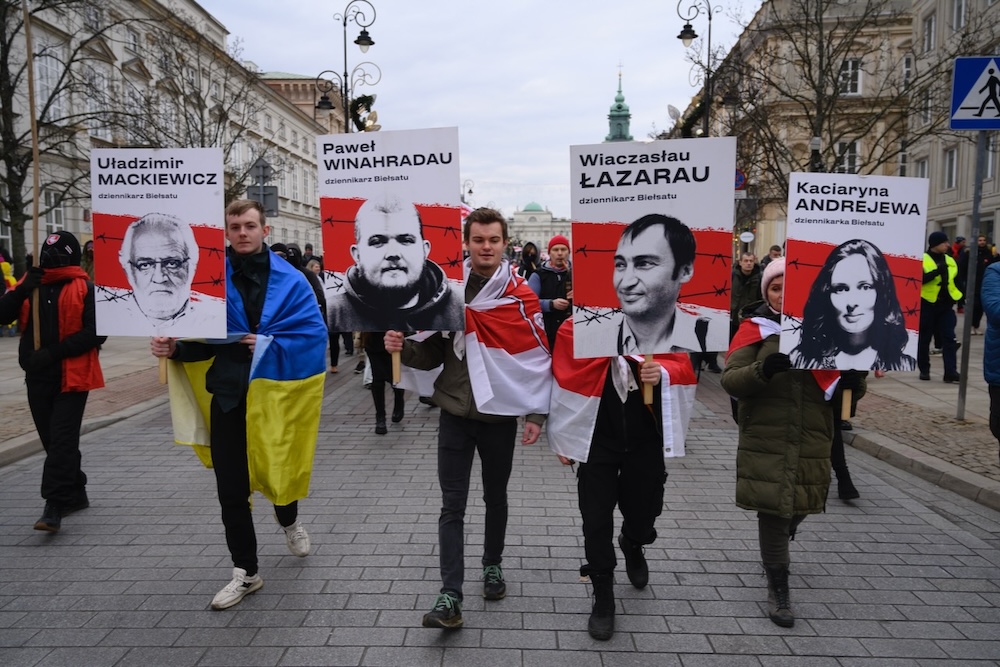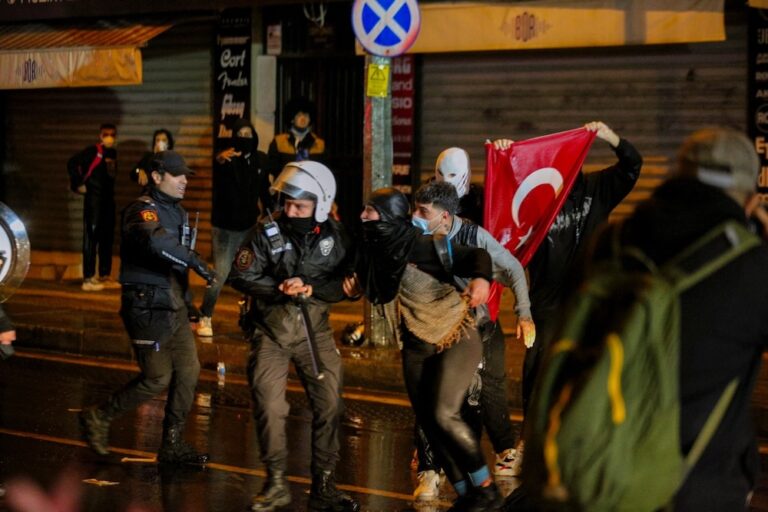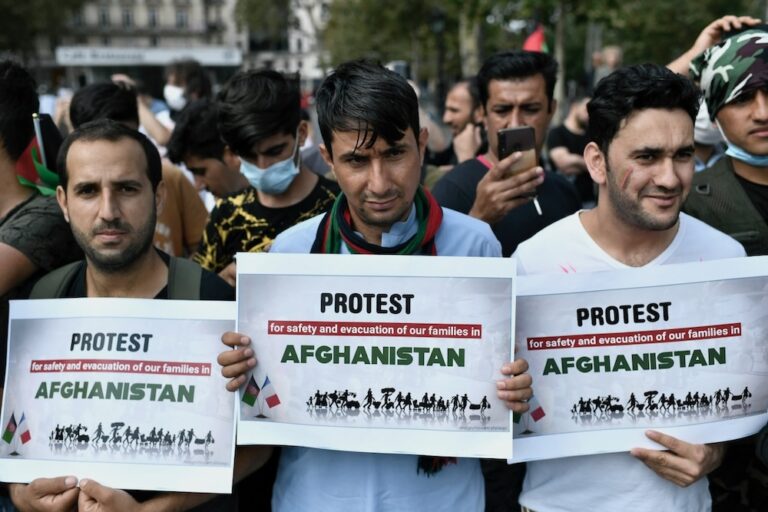January 2025 in Europe and Central Asia: A free expression and civic space round-up produced by IFEX's Regional Editor Cathal Sheerin, based on IFEX member reports and news from the region.
A presidential election in Belarus; misogynistic violence and attacks on press freedom in Turkey; Navalny’s lawyers imprisoned in Russia; a veteran journalist handed ten years in prison in Tajikistan; Palestinian-American journalist arrested and deported from Switzerland; BAJ’s Deputy Chair placed on wanted list; a year of press freedom violations in Ukraine; and “defending cartoonists and their right to create without fear”.
Belarus: Political prisoners in the spotlight during election
A presidential election was held in Belarus on 26 January. The regime’s decimation of any kind of viable political opposition, and its ongoing suppression of dissent, ensured that the result – the re-election of President Lukashenka – was never in doubt.
The months leading up to January’s vote saw attacks on independent voices intensify. In its World Report 2025, Human Rights Watch (HRW) describes the Lukashenka government’s persecution of critics as having reached “new heights” in 2024. Among the several ongoing rights violations that HRW highlights are: the persecution (both at home and in exile) of journalists, lawyers, human rights defenders and critics of Russia’s invasion of Ukraine; and the torture and ill treatment of political prisoners (of which there are approximately 1,240).
The second half of 2024 saw several developments involving Belarus’s political prisoners. Many of these events should be viewed as part of the Lukashenka regime’s efforts ahead of the presidential election to both undermine opponents and act as a warning to anyone thinking of presenting themselves as political opposition:
- Between July and December 2024, the authorities released 237 political prisoners. At least another 20 were released in January 2025. According to HRW, many of these “were forced under duress to sign an official plea for pardon, which includes admission of guilt”.
- In early January, imprisoned former presidential candidate Viktar Babaryka was seen for the first time since he was detained in 2020. He had been held incommunicado since then. The “sighting” came in the form of a short video in which he sent greetings to his family, and three photographs. There was a similar ‘sighting’ of imprisoned opposition leader Maria Kalesnikava in November 2024, though there has been no news of her situation since then.
- In mid-January, four imprisoned Radio Free Europe Radio Liberty (RFE/RL) journalists – Yuras Zyankovich, Ihar Losik, Andrei Kuznechyk and Ihar Karnei – appeared as “interviewees” on a state TV show that accused them of “trying to set fire to Belarus”. The “interviews” were conducted by a recognised regime propagandist who has often travelled with state security agents while they make political arrests. The four RFE/RL journalists are among over 30 press workers who were still behind bars at the end of 2024, making Belarus one of the top four jailers of journalists in the world, according to the Committee to Protect Journalists’s (CPJ) recently-published census.
Ahead of the presidential election, Reporters Without Borders (RSF) filed a complaint with the International Criminal Court (ICC), accusing Lukashenka of crimes against humanity due to his regime’s systematic persecution of journalists.
In early January, IFEX members marked the fourth anniversary of the detention of journalist Andrei Aliaksandrau, who is currently serving a 14-year prison sentence on trumped up charges. Index on Censorship launched an online action (#FreeAndrei) – featuring a poem written by the journalist – to highlight his case.
At the end of the month, it was reported that Barys Haretski, exiled Deputy Chairperson of the Belarusian Association of Journalists (BAJ), has been placed on Belarus’s and Russia’s wanted list. The exact nature of the charges against him has not been made clear.
Turkey: A harrowing year for women and journalists
Attacks on press freedom
The government of Turkey made journalists’ lives “a living hell” in 2024, according to Bianet’s recently-published Media Monitoring Report.
The report reveals that at least 25 journalists and five media outlets were attacked last year, with another 82 media workers receiving threats. Most of these assaults on press freedom were carried out by individuals and groups associated with the far-right Nationalist Movement Party (MHP).
According to Bianet’s research:
- At least ten journalists were serving prison sentences in 2024;
- 57 journalists were detained “often facing police violence and subsequently released under judicial control measures such as travel bans, mandatory signature requirements, or house arrest”;
- 36 journalists were convicted for “insulting a public official,” “insulting the President,” “targeting officials involved in counterterrorism,” “terrorist propaganda” and “membership in a terrorist organization”;
- Access blocks were imposed on 3,136 news reports and other journalistic content;
- Three broadcast bans were imposed.
January also saw the International Press Institute (IPI) project, ‘Free Turkey Journalists’, publish a very useful factsheet covering press freedom violations in Turkey during 2024.
According to data collected by IPI, at least 378 journalists stood trial in 2024. As in previous years, the most common charges against these members of the press were terrorism-related (38%), defamation/slander (27%), and “insulting the president” (7%).
IPI also highlights the worrying role played by Turkey’s so-called ‘disinformation’ law (passed by parliament in 2022), which IFEX members warned would be weaponised against journalists working in the public interest. Last year saw six investigations filed against journalists under this legislation, three detentions and one conviction.
However, January also saw ruling Justice and Development Party (AKP) MPs arguing that the ‘disinformation’ law doesn’t go far enough, especially with regard to cyber security threats. This month, they introduced a “cyber security” bill that could make it a criminal offence to report on a data leak. Critics of the draft law – which provides prison sentences of up to five years for those convicted of creating a “false perception” of a data leak – argue that the vaguely-worded legislation could be used to target investigative journalists. Tellingly, the bill comes on the heels of highly embarrassing revelations of a massive data breach in 2024 that raised questions about the Turkish government’s ability to protect Turkish citizens’ private information.
Misogynistic violence
Turkey’s problem with misogynistic violence was also put under the spotlight this month in Bianet’s disturbing annual Male Violence Monitoring Report. The statistics presented for 2024 are horrific: last year saw men kill 378 women, injure 645 women, and force 772 women into sex work. According to Bianet’s research, the killers were most likely to be either husbands/partners (70%) or family members (17%). Most of the women (60%) were killed by gunshot.
Turkey has long had a severe problem with misogynistic violence: in the almost 15 years from January 2010 to November 2014, men killed at least 4,179 women and injured another 7,221. The authorities’ response to the problem has been inadequate, to say the least, with the perpetrators of this violence mostly enjoying impunity. In a dark irony, women’s marches marking the International Day for the Elimination of Violence Against Women (25 November) are regularly banned, and those women who do march often face arrest: at least 169 women were arrested in Istanbul in November 2024.
Turkey withdrew from the Istanbul Convention on preventing and combating violence against women in 2021. Since then, women’s rights groups have been calling for Turkey to reverse that decision. This is very unlikely to happen anytime soon: in October 2024, President Erdoğan declared that his withdrawal from the Convention had not had any “negative impact on women’s rights”.
In brief
In Tajikistan, veteran journalist Ahmad Ibrohim – chief editor of the independent weekly newspaper Payk – was sentenced to ten years in prison on highly questionable charges of bribery, extortion, and extremism. CPJ called on the Tajik authorities to “immediately release Ibrohim, along with seven other journalists serving lengthy sentences on retaliatory charges, and reform the country’s repressive media environment”.
Since late 2023, the authorities of some European states have demonstrated a marked and heavy-handed intolerance for pro-Palestinian expression. January saw another high-profile example of this when Palestinian-American journalist Ali Abunimah was arrested in Zurich, Switzerland, and held for 3 days prior to being deported. According to Abunimah – who was on his way to a teach-in on Palestine when he was detained – he was never told the charges he was arrested under (only that he had “offended Swiss law”) and was denied contact with his family. Whilst detained he was questioned by Swiss intelligence agents. The UN Special Rapporteur on freedom of opinion and expression, and the UN Special Rapporteur on the situation of human rights in the Palestinian territories occupied since 1967, condemned Abunimah’s arrest.
In its overview of 2024, the Institute of Mass Information (IMI) reported that it had recorded 268 violations of free expression in Ukraine during the year. Most of these (155) had been committed by Russian forces, and included killings, woundings, kidnapping, cyberattacks and threats.
In recent weeks, lawmakers in Russia have begun increasing the reach of repressive laws relating to “foreign agents”, “fake news” and “discrediting” the army: in mid-December, the lower house of parliament passed a bill which, if it becomes law, will add to Russia’s list of “terrorists and extremists” individuals who have been found guilty of disseminating “fake news” or “discrediting” the Russian army”; in late December, President Putin signed into law legislation that tightens financial restrictions on “foreign agents”; and in mid-January, the president of the Russian State Duma commission “on preventing foreign influence” announced that the parliament would prepare legislation aiming to “bring to justice foreign agents living abroad”.
January saw three lawyers who defended opposition leader Alexei Navalny (who died in Russian custody in 2024) handed prison sentences on spurious “extremism” charges: Vadim Kobzev, Alexei Liptser and Igor Sergunin received prison terms ranging from three-and-a-half to five-and-a-half years.
In early January, several IFEX members marked 10 years since the terrorist attack that killed 12 staff and wounded four at the offices in Paris, France, of satirical magazine, Charlie Hebdo. Cartoonists Rights issued a statement reaffirming their commitment to “defending cartoonists and their right to create without fear”. The European Federation of Journalists (EFJ) called for greater protection for journalists. RSF and Cartooning for Peace launched a campaign to highlight the risk cartoonists face around the world solely for their creative work.



